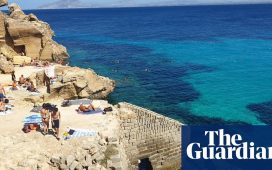Wild camping
I was deep in the folds of the mountain of Tryfan when it first happened. When time seemed to stop ticking at the breakneck pace it always does when Iâm sitting at laptop, working on a deadline. Instead of blue light from a screen, I was sitting at my tent door, basking in the purple glow of dusk as it crept into the Ogwen Valley, in Eryri/Snowdonia national park. The luscious green of the grass on the mountainside had turned a more muted shade and the blue of the Menai Strait in the distance had become barely distinguishable from the twilight sky.
I find the whole process of wild camping meditative â from packing my backpack before I leave, to planning a route on a map, slowly making my way to my chosen pitch, then methodically finding and creating my bed for the night. But itâs not until I have unfurled my camping mat and sit swaddled in my sleeping bag â warm but with the exhilarating chill on my face from the cool night air â that the true magic begins.
I often choose to sleep out because something is on my mind and I need the space to think it through. But once Iâm there, I find that I think of nothing at all. I am present in the moment.
Phoebe Smith
Sailing
Sailing, sometimes, is slower than walking. Sometimes, in fact, youâre going backwards. Often, youâre pointing away from where you want to go. Itâs a pace that suits me, though. Why rush, when the journey is all the destination you need?
Best of all is when I let my boat choose its own route. Thatâs what happened when I came to Greece. When beautiful Paxos was swarming with speedboats, we escaped and floated off to sea. I was unsure of our direction when it struck me: donât choose one! Just go where the wind blows best. I set the sails to the light northerly and we slowly headed east. Gentle sailing, time for dreaming. I stared at shifting shades of sea and landscape. I watched hypnotised as a spinning jelly overtook us and marvelled at terns plunging like rockets. Free and happy, drifting in a slow-motion trance. A state of mindfulness out there on the water, achieved without trying.
As the sun started to sink, I saw a bay and headed in. We dropped anchor outside Aphroditeâs cave. What a reward! A splendid home for the night and a wonderful welcome to Greece.
Susan Smillie
Foraging
It was after many years of foraging that I realised why, apart from the free food and the pleasant afternoons out, it had become such a central part of my life. It was this: every year my father would take the family on trips to pick blackberries and trips to gather cockles. I loved every minute of every one. These, I now understand, were the only childhood experiences that felt truly and entirely real.
I am guessing here, but I believe this is because foraging is something we do quite naturally, an instinct even. When we follow this instinct, nature rewards us, quite simply, with peace. Our minds clear in the single-minded pursuit of our quarry and we feel part of the world, not just someone walking through it.
I have seen this a thousand times in others who have accompanied me on my organised walks, where I merely encourage people to walk slowly, and to observe. I have even seen people in tears of joy, and, years ago, a man who had evidently been given the day as a gift he did not seem to want, told me quite flatly as we said our goodbyes, âIÂ am happy.â He was.
John Wright
after newsletter promotion
Fishing
The best times to cast a line are at sunrise and sunset, breakfast and dinner for fish. Which is why I turned into something of a crepuscular creature when I took up fishing in my childhood. Iâd set the alarm on Saturday and Sunday mornings, jump on my bike in the dark with my rod and tackle and head for the mill race down the road. Except that I would regularly spend 12 hours in freezing conditions, fishing on the riverbank. It never felt like a long time to be out, though my mum recently shared that she would drive by the spot and look through the hedge to make sure I was still there. My friends and I would stay well past dark, never wanting the day to end.
It has been that way for me ever since. I lose all sense of time when Iâm on a river. Something about the sweet earthy smell and the constant movement of the current act as a hypnotic and clear my head. Looking for fish beneath the surface, I can become transfixed by a ribbon of weed dancing in the flow, only for the spell to be broken by the iridescent flash of kingfisher darting by. I can walk for miles in a day, hunting out the rises of feeding fish, but equally I can be surprised to discover that Iâve been casting to the same fish in the same spot for over three hours. It has never felt like time wasted.
In summer, when the sun eventually dips and the light begins to fade, swallows arrive and skim the surface for freshly hatched insects. The fish begin to feed again. And I never want the day to end.
Andy Pietrasik
Beachcombing
In 1990, a couple walking along West Runton beach in Norfolk stumbled across the skeleton of a steppe mammoth â the largest and oldest fossilised elephant ever found in Britain. A family holiday to that same resort, 25 years later, happened to coincide with my six-year-old daughterâs âdinosaur phaseâ. I told her about the discovery and the rest of the week was spent scouring the beach for the remains of ancient creatures. We never found a woolly mammoth, but we did find several âsabre-tooth tiger teethâ (later revealed to be belemnites, an extinct, squid-like sea creature) and a new favourite pastime was born.
These slow walks along the tideline have become part of the fabric of our trips to the seaside. All sense of time is lost as we inch along in companionable silence, eyes down, often ending up miles from our starting point.
The most intriguing finds are taken home and added to a large glass jar on the bathroom windowsill: ammonites from Whitby, sea glass from Brittany, a hag stone from Dungeness, and shards of patterned porcelain found on the estuary beaches of Southend.
Scientists use these fossils and fragments to conjure up a picture of vanished landscapes â frozen tundra, inland seas, dense rainforests. In much the same way, we use them to conjure up memories of holidays past. My daughter is 14 now and no longer wishes to build sandcastles or play beach cricket, but sheâs never tired of searching for the woolly mammoth.
Joanne OâConnor











